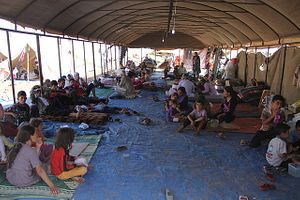With the Western world predominantly reinventing the “Coalition of the Willing” and dispatching arms and air support to Kurdistan, where the Peshmerga have stood alone in battling the Islamic State, pressure is rightly being applied to Southeast Asia to pitch-in, particularly ASEAN’s three predominantly Muslim members: Indonesia, Malaysia and Brunei.
Jakarta and Kuala Lumpur have loudly distanced themselves from IS amid fears their nationals, who trained with IS leader Abu Bakr al-Baghdadi, will return having learned terrorist tactics in order to back demands for a Southeast Asian caliphate.
Brunei, which introduced sharia law in May, has been predictably quiet amid reports its ruler Sultan Hassanal Bolkiah was hoping to buy the landmark Plaza Hotel in New York in a deal worth more than $2.0 billion, which would also include the famed Grosvenor House hotel in London.
In Australia, columnists have urged Prime Minister Tony Abbott to try and persuade his Malaysian counterpart Najib Razak and recently elected Indonesian President Joko Widodo to contribute more than words, and send money, arms and perhaps troops to Iraq, where the Islamic State has made great inroads via Syria in recent months.
“Involving Indonesia and Malaysia in Iraq now would also have a big symbolic advantage. It would help rob the extremists of their religious pretensions that Western Christian ‘crusaders’ are the enemy if forces from Indonesia, the world’s most populated Muslim-majority nation, are also on side,” Sydney Morning Herald columnist Daniel Flitton wrote.
Help for the beleaguered Kurds, who were abandoned by a retreating Iraqi army as Islamic State forces swept through, has been coming from all corners of the globe. The German government has approved an arms and munitions aid package worth $91 million to be delivered in three tranches, and offered training.
Australia has deployed its air force to deliver weapons from several countries, while the U.S. has provided heavy air support and financial commitments. U.S. Defense Secretary Chuck Hagel said Albania, Canada, Croatia, Denmark, Italy, France and the U.K. would also provide Kurdish forces with “urgently needed arms and equipment.”
Indonesia is potentially the greatest source of help from Southeast Asia. The government has moved to clamp down on any attempts to revive Jemaah Islamiyah (JI) after its chief ideologue and hardline cleric Abu Bakar Bashir swore his allegiance to IS from his prison cell.
JI was responsible for a string of bombings mainly in Indonesia in the 2000s, including the first Bali Bombing in 2002, which left more than 200 people dead. All its leaders have been jailed, executed or killed.
Malaysia has also made recent arrests amid reports that four new terrorist groups have emerged to stake a claim over much of mainland Southeast Asia. Police are hunting additional militants who escaped the dragnet and are believed to be hiding with the militant group Abu Sayyaf in the Philippines.
In June, Najib erred badly when he told his ruling party to emulate the bravery of Islamic State militants if they wanted to survive as politicians.
But last week he issued a five paragraph statement which in part read: “We deplore those responsible, and call on the international community to act in concert to prevent further violence.”
However, he failed to outline what Malaysia would do beyond its own borders.
No country within ASEAN can claim to be impervious to the forces aligning with IS.
A video from the Islamic State in Syria and the Levant (ISIS) – the forerunner to IS – titled There Is No Life Without Jihad, boasted about the foreign mercenaries it had enlisted from as far away as Cambodia.
The Philippines and Thailand continue to combat Islamic insurgencies within their own borders.
However, ASEAN is notorious for its incoherent approach to foreign policy, and that will no doubt continue, to its detriment, unless the Muslim countries in the bloc – Indonesia, Malaysia and Brunei – are prepared to stand-up and lead on this issue.
Luke Hunt can be followed on Twitter @lukeanthonyhunt

































